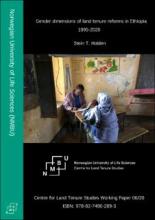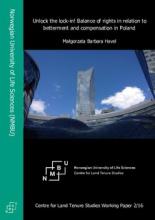Land Library
Bem-vindo à Biblioteca do Land Portal. Explore nossa vasta coleção de recursos de acesso aberto (mais de 74.000), incluindo relatórios, artigos de revistas científicas, trabalhos de pesquisa, publicações revisadas por pares, documentos jurídicos, vídeos e muito mais.
/ library resources
Showing items 1 through 9 of 24.This chapter investigates how land tenure reforms in Ethiopia have influenced the position of women in terms of land tenure security, access to land, decision-power over land within households, as well as the gendered impacts of these tenure reforms on land investments, land productivity, land re
This report presents two papers developed in order to study behaviour in trust games in 18 Malawian villages in 2007.
Continued high population growth in already densely populated rural areas in parts of Sub-Saharan Africa makes it harder for youth to choose agriculture as their main source of income. We investigate whether near landless youth can still access rented land as a complementary source of income.
The Mekong Region Land Governance (MRLG) project and the Forestry Department of the Ministry of Natural Resources and Environmental Conservation (MONREC) co-hosted the “Mekong Region Customary Tenure Workshop” on 7-9 March 2017 in Nay Pyi Taw, Myanmar.
Summary report of Mekong Region Land Governance (MRLG)'s online dialogue on 'Recognition of Customary Tenure in the Mekong Region' held in 2017, containing justification for the dialogue, key take-aways, next steps and recommended resources, published by MRLG in 2017.
This chapter is written for the European Commission for a book to be published by Springer on The Role of Smallholder Farms in Food and Nutrition Security. The author takes full responsibility for the content.
Many Polish cities are faced with a dilemma: to enact their local land-use plans and be exposed to the immediate financial consequences of their adoption, or to protect their budgets against these costs and give up control of the development of the cities.
Population growth leads to growing land scarcity and landlessness in poor agrarian economies. Many of these also face severe climate risks that may increase in the future.
Paper prepared for presentation at the “2016 WORLD BANK CONFERENCE ON LAND AND POVERTY” The World Bank - Washington DC, March 14-18, 2016








